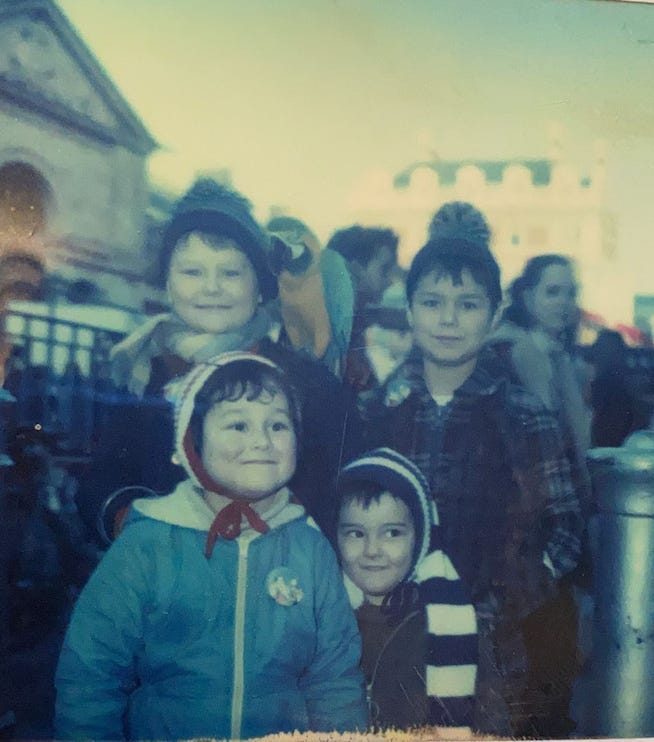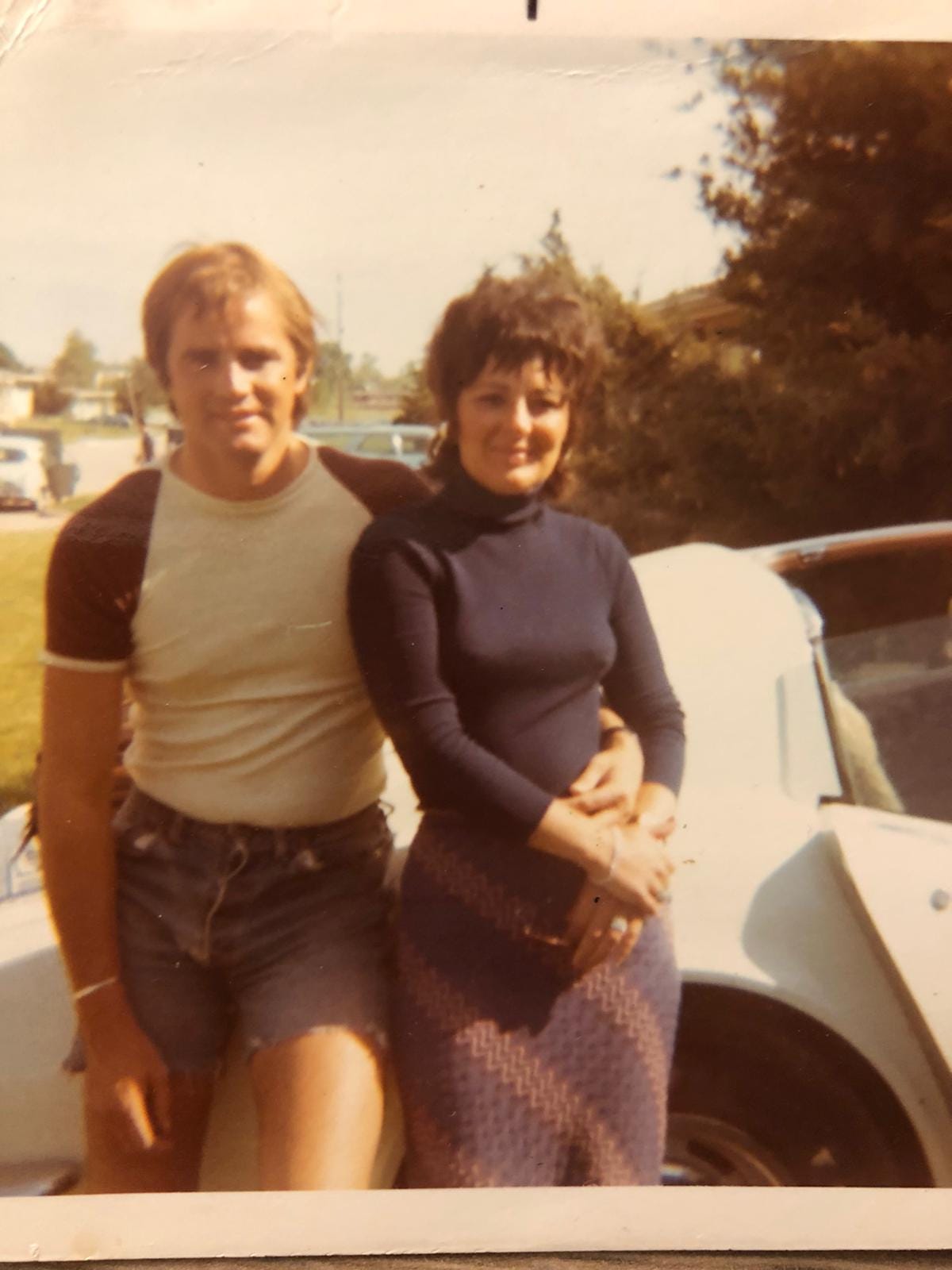Epilogue
April 2021
It’s only been a few months since my father passed away. I sometimes have to remind myself that it actually happened, that it’s different to the years he simply wasn’t around. I’ll force myself to remember Jonathan interrupting our group phone call that Wednesday evening to say: ‘He’s gone, dad died’. And then I’ll finally start to feel something other than absence.
It’s the same breathless tightening of the chest and that sensation of falling backwards into myself again. It’s a cascade of memories, mostly punishing ones, like the many times I wished him dead to his face. Screamed at him for being a monster to us (which is true), for selling the houses and spunking the money, for showing such disloyalty to mum’s memory—being so quick to blame her for his financial problems, or lie that she had wanted the various cosmetic procedures he had convinced her to get, or even to pretend she had been biracial as a way of trying to ingratiate himself with some Sri Lankan or West Indian person he had just met—despite the flawed logic of this, and the casual cruelty of rewriting or erasing our mother’s identity for some whimsy.
Then an image of his cheeky, mischievous smile will pop into my head and I’ll think about how stubbornly funny he was. How he never held grudges with us and was so quick to forgive, even after we stole his credit cards or yelled at his face and wished him dead. I’ll hear the sweet sound of his scratchy machine-gun laughter, already faded, that used to convulse his entire body—especially when he was being mean about someone’s appearance.
His body—those nipples like big pencil erasers that we used to tease him about, that I jokingly pinched in the hospital the day before he died. The deep canyons and ridges of excised muscle on his left arm from relieving a trapped blood clot. The cluster of surgery pockmarks on his stomach above where he once ruptured his bowel. The exclamation-mark keloid bisecting his chest from a heart bypass. The dull-yellow skin graft above his eye from surgery to remove a lesion. The stump of his left leg, the cause of so much diminishment over his last two decades, that he seldom complained about.
All of these ravages to the corporeal that he suffered and accepted only to succumb to something so mundane.
By rights, he should have died from a shark attack. Or a virus that turns you into an explosive—causing the infected to take out a few innocent bystanders in a dynamite blast and then light up the sky like a crossette firework. Only this could have done justice to his exuberance, his light, the beautiful devastation of his presence that I will miss.
Death is never a rightful end for any of us, of course. It can never befit the hot-blood pumping, impulse driving, searching, sensory multitudes of a life.
Just the other day, I thought I sensed my father in the room with me. It was nothing as grand or demonstrative as a smoky apparition, and years of tuning out and deadening my feelings to anything supernatural have made me doubt these sensations. However, I walked into the bedroom to get changed after showering and instantly felt him there.
I knew it on a cellular level. Every atom of my being stiffened with excitement—like that first home-time glimpse of a parent waiting at the school gate.
‘Dad, is that you?’ I called out into the centre of the room.
I stood there waiting, convinced he had found a loophole or worked another of his grifts—some way of confounding death because he was desperate to see me or needed me to know that his spirit was too stubborn and irrepressible to die.
I thought something might happen, that the blinds would close or a pillow levitate off of the bed.
‘I love you, dad’ I said proudly, letting him know that I wasn’t scared.
I continued to wait, willing him to communicate in some way. To call my name, stroke the top of my head, smash up my desktop computer, or say ‘boo’ even. But nothing happened.
After about a minute, the atmosphere in the room shifted with a sensation like the receding warmth when a lightbulb is switched off and I understood that he had gone again.
At first I felt deflated—suddenly low and empty, and then quickly distended with grief. As I got dressed though, a thought formed in my mind: the gesture is enough. It didn’t need to be bold or declarative. It didn’t matter if I still doubted myself or questioned my sensitivity. I had felt my father’s presence, his energy in the room with me and for that moment, be it figment or phantom, he was there.
I didn’t tell my brothers what I’d felt, not that I feared they’d doubt me but because I wanted to keep it for myself. Also, the weeks following my father’s death have been an exhausting onslaught of shared and competing griefs over a group WhatsApp thread (“Love you dad, always”) that I’ve since had to leave.
To begin with our group messaging was a way to stay connected during a third national lockdown. It was a space for outpourings of support and encouragement—mostly, the three of us counselling Jonny and responding to his despairing, spiralling posts with endless reassurances that he had done right by our father and given him a happy, comfortable life in what turned out to be his final few years.
Soon however, beyond the deluge of old photos and videos (many showing dad looking increasingly rough and old throughout our period of estrangement), it became a battleground of all things unspoken.
Jonny would channel his obvious resentments towards us by editing our photos to make us look like clowns or monsters, or me the devil. And we played along, laughing off these unsolicited pictures with ‘hahaha’ responses despite finding them bizarre, mean-spirited and particularly galling given how much anger we were each suppressing in order to remain kind and civil.
Then Christiaan might interject with some bigger brother-style ribbing as a way of trying to defuse any bubbling tensions, which Jonny would respond to with escalating derangement and hostility through more pointed jokes, platitudes and indirect attacks on our lives and characters:
(Text accompanying a picture of a fish tank):
The energy in the kitchen is amazing xxx you should get one Rudi ,fish clean negative forces xxxx
(Referring to his dog):
Zeus is a mean gay like Rudi xxxxx he also bites like Rudi xxxx gays can be evil too xxx
Rudi I love you
(Jonny’s take on our conformist lives):
My god xxx our culture is so boring Thankyou god I’m the only none English in family xxxxxxxxxx. With in two years I’m out of here xx for good xxx. If we all carry on x ?? Dad said the truth about life is ? Leave a good book to read . Is your book exciting, lovely fear based . They is no gold standard to life , but the worse thing in life is being boring xxx.playing safe is the same as boring xxxx this country does not help in any way ...
Nicholas closed the circle (of us each replicating and performing our age-old roles within this family dynamic) by mostly keeping his distance on the thread. Whilst Christiaan and I compulsively checked and replied to Jonny’s messages out of fear and anxiety—still believing, as we’d been taught by mum, that we had to cradle and protect Jonathan at all costs, even to our own wellbeing—Nicky only texted when Jonny’s deifying “dad was a god” sentiments irked him enough:
(Nicholas’ text accompanying a gif from The Exorcist with Fathers Merrin and Karras casting holy water and saying: ‘The power of Christ compels you!’)
Just getting ready for Dad’s eulogy.
In all, I stayed on the group chat for about five weeks absorbing all of Jonny’s jibes and jabs in between a dizzying number of shared photos of dad—some from before his leg amputation that startled me because I’d genuinely forgotten how young and healthy he had looked in his early fifties.
I didn’t react or let my other brothers know how I was feeling, navigating fresh grief while trying to dodge enough of the shrapnel from Jonathan’s grenades.
I remained passive because I thought this was tantamount to being humane, that letting things slide in a pretence of supportive brotherhood meant we had all evolved. That we had somehow beaten the odds and broken free from the stymieing, suffocating prison of a problematic childhood.
I wanted so much for this to be true, to believe that we had finally mended those bonds that had been warped and broken by divisive and unhealthy parenting, and surviving resentments following mum’s death. So I said nothing and continued to suffer for the illusion of a greater good—the idea of a happy, well-adjusted family. I did this until I was no longer able to.
Nothing that dramatic or hateful happened to prompt my exit from the group. However, Jonathan had started to pepper his pontificating messages and sly digs with little worry-bombs like: Just went to the best heart doctor–, In hospital now–, I nearly died 6 months ago– which created more uneasiness in my stomach and revived old concerns for his safety. He then stopped responding to messages on the thread and didn’t answer his phone for four days straight, which piqued our collective fears about his mental state given that we could each tell he’d been reading our texts.
While Christiaan reached out with increasing desperation, trying to get Jonathan to respond: ‘Are you okay Jonathan Roman?’… ‘How is Jonny Jon Jon?’… ‘Hello? Earth to Jonny?’ I turned inwards, allowing my anger to gradually supplant the anxiety that often resides when I’m in regular contact with my family.
I became so frustrated by Jonathan’s blatant attempts at emotional manipulation, adding to those unresolved hard feelings about what had happened with dad, that I stopped messaging altogether. And when Christiaan’s eighth message to Jonny went unanswered, I realised that it wasn’t enough to be silent. I was still torturing myself by obsessively checking the group chat for an update every ten minutes and needed to keep away.
*****
I don’t know what the future holds for me and my family. It would have been great to end this story on a more positive, definitive note—to tie a big, pretty bow around everything. I would have finished with some powerful, life-affirming episode that showcased some real growth and humanity in our relationships.
This ideal scene would be driven by a “love conquers all” sentiment where all of our enmity and sadness and the invisible fetters of mental illness (particularly mine and Jonathan’s) would simply be magicked away because loving one another was enough. But this is real life.
Nothing is fixed. Perhaps one day I’ll be able to share more of myself with Jonny, or have a stronger bond with my other two brothers. For now though, we are four men living four distinct lives who shared the same mum and dad—and I’ll always be grateful for this.



